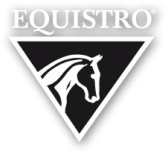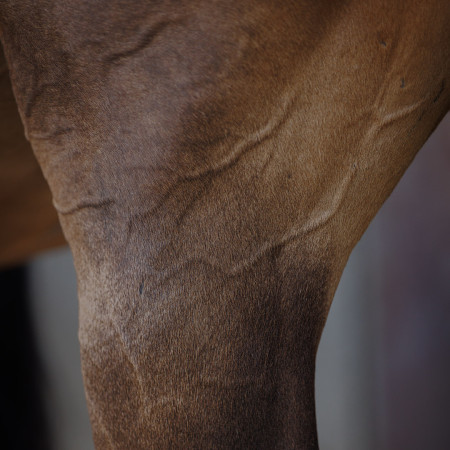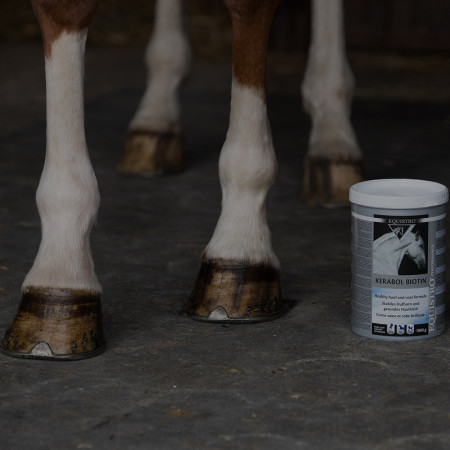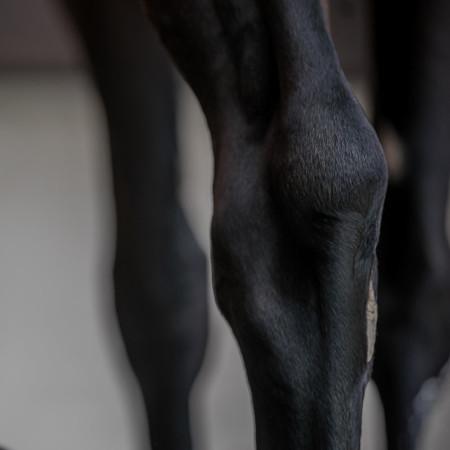
Computer-aided feed composition
Description
Nowadays horses can generally not entirely cover their needs for minerals and trace elements or any extra requirement for a specific substance with forage and concentrated feed. A mineral feed that is adapted to the horse’s individual performance requirements or a feed supplement that is tailored to the horse's extra needs in special situations is often sufficient to ensure a comprehensive supply for the equine organism.
How can I find out if my horse is lacking anything?
Finding this out is not difficult but somewhat time-consuming. Besides assessing a horse’s nutritional status (BCS system), state of care (condition of coat and hooves) and fitness level, initial indications can also be obtained via a blood count or tail hair analysis (e.g. for zinc levels). Unless performed at regular intervals, a blood count however only offers a snapshot of the horse and should therefore never be the sole factor taken into consideration for changing your horse’s diet. The most important factor in terms of feed is a comparison between the horse’s actual requirement for all vitamins, trace and bulk elements, as well as protein, carbohydrates and fats and the amount of these substances contained in his daily rations. in accordance to the daily level of work required. A computer program can be used to calculate the levels of ingredients making up the daily diet and then to compare them with the horse’s current requirements depending on the individual situation.
Computer-aided calculation of rations – how and where?
If you wish to calculate feed rations yourself, you will need a large database and also make a major effort in terms of programming. Such services are not only available from vets specialized in nutritional advice but are also offered by veterinary medicine university. It is additionally possible to have samples of forage and concentrated feed analysed as regards their exact ingredients. This can be particularly important when the aim is to reduce levels of certain substances in feed (e.g. carbohydrate or protein) due to health-related aspects.
There is however an option for horse owners to themselves get their horse’s rations calculated in just a few steps and to easily adjust the diet according to the outcome. To ensure results are as accurate as possible, they have to provide certain data about the animal such as breed, age, gender, housing, daily grazing, workload, weight, etc. It is also necessary to specify all feed quantities in g/kg/ml (forage, concentrated feed, supplementary feed etc.). Ideally, the composition and time of harvesting should also be known in the case of forage.
What requirements should I use for my horse?
Basics of feeding horses:
Maintenance requirement and performance requirement
The maintenance requirement is the amount of food a horse needs when it does not have to work. Here we distinguish between body weight, temperature, housing conditions, breed and age. After calculating the maintenance requirement, it is then the turn of the performance requirement.
The performance requirement is added to the maintenance requirement if the daily routine also includes a specific “workload” the horse is additionally required to perform, e.g. training, use for breeding, pregnancy or growth.
With every extra demand on performance, there is a further need for extra energy in addition to the horse’s maintenance requirement, as well as for vitamins, trace and bulk elements depending on the type of work involved.
Light or heavy work - how much does my horse actually do?
Light work:
Riding for 1 hour – easy work at walking pace and trotting, little cantering; leisurely rides with some cantering.
Moderate work:
Riding for 1-2 hours – more intensive work with cantering and participation in tournaments; hacking with a lot of cantering.
Heavy work:
Riding for more than 2 hours – horses trained for high performance such as race horses, long-distance horses, jumpers and dressage horses in advanced classes and draught horses pulling heavy loads for long periods of time.
Dr. med. vet. Caroline Fritz










